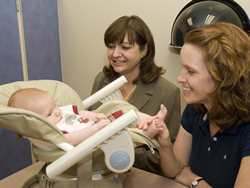Prenatal Depression Can Lead to Cognitive Deficits for Babies; Intervention Available

When you hear “baby blues,” chances are you think of the kind that hit after the baby is born – thanks to all the attention postpartum depression gets in the media and from celebrities like Brooke Shields.
But, as one University of Alabama researcher found, depression during pregnancy, or prenatal depression, is even more common and can lead to deficits in infant development.
“Prenatal depression, reported in approximately 1 out of every 10 pregnant women, has been linked with deficits in infants such as attenuated response to social stimuli, excessive crying, and increased sleep problems,” says Dr. Maria Hernandez-Reif, professor of human development and director of the Pediatric Development Lab in the College of Human Environmental Sciences at UA.
For the last 12 years, Hernandez-Reif has been studying the effects of maternal depression during pregnancy on fetal and infant development. Her research, begun while she was at The University of Miami’s medical school, found the stress hormone, cortisol, seems to be one potential mechanism for transmitting a mother’s stress to her unborn baby.
London researchers collecting samples from fetuses found the fetuses’ stress hormone levels were elevated if their mothers’ stress hormone levels were elevated, Hernandez-Reif said.
“The London researchers concluded that about 50 percent of the mothers’ cortisol during pregnancy crosses the placenta into the fetal womb environment, which could negatively affect fetal development, including provoking the fetus to mount a stress response, which may lead to higher fetal cortisol levels.
“In our research, using ultrasound technology, we found that fetuses of depressed mothers were more active in the womb and had smaller heads. Depressed mothers are also more likely to have their babies born preterm, which may relate to the mother’s elevated cortisol levels.
“In addition, infants of depressed mothers are more irritable and have more difficulty falling asleep. They also show higher cortisol stress hormone levels than infants of non-depressed mothers, suggesting that infants born to depressed mothers may come into the world stressed or may be predisposed to depression.”
And that negative prenatal environment, says Hernandez-Reif, may also relate to development of learning disabilities. Animal studies show that elevated cortisol affects brain development.

In studies on infants of depressed mothers, Hernandez-Reif found behaviors suggesting the infants may be experiencing cognitive deficits shortly after birth.
She compared the “looking behaviors” of infants of depressed and non-depressed mothers to different stimuli, like their mother’s face and a female stranger’s face. According to Hernandez-Reif, infants of depressed mothers took twice as long as infants of non-depressed mothers to learn both sets of faces. In addition, infants of depressed mothers did not appear to distinguish between the mother’s and female stranger’s face.
She also gave them objects to hold in their hands, and she found, similar to visual learning, they took longer to examine objects in their hands and they did not discriminate the objects. In addition, infants of depressed mother sucked more than infants of non-depressed mothers. The greater sucking by infants of depressed mothers might relate to a greater need to regulate or pacify, she said.
“There is something happening with these babies, and we need to pay attention to this because we don’t know the long term effects of being exposed to elevated cortisol on the brain development of these children.”
One result Hernandez-Reif would like to see is greater awareness of pre-natal depression and longer tracking of infants of depressed mothers through school age. “If we can intervene with these mothers during pregnancy, identify them, and treat them, then we may be able to help the mothers and the outcome of the babies in the long-term.”
At the Pediatric Development Research laboratory at the Child Development Research Center, Dr. Hernandez-Reif and her students will continue the study of maternal depression effects on infant development and cortisol.
Interventions planned for expectant mothers include referrals for counseling, exercise programs, including yoga and massage therapy, and music therapy. Mothers will also be taught how to massage their infants. Long term goals include tracking the children of depressed mothers to determine whether early infant experiences predict school outcomes.
Additional Links
- Child Development Research Center
- Pediatric Development Research Laboratory
- When Depression Strikes during Pregnancy
- Prenatal Depression
Contact
Deidre Stalnaker, UA Media Relations, 205/348-6416, dstalnaker@ur.ua.edu
Source
Dr. Bruce Berger, 205/348-7692, berger@apr.ua.edu